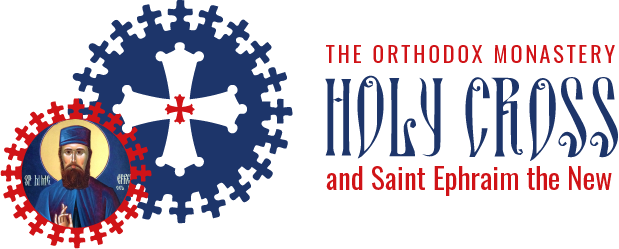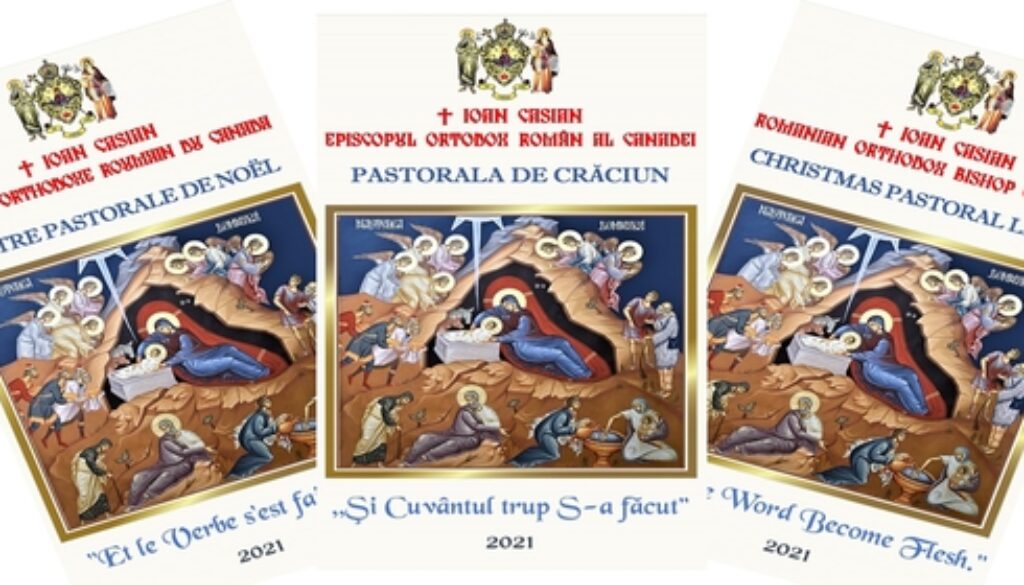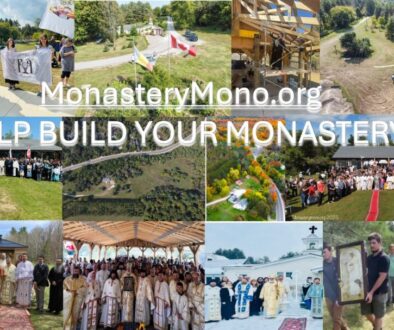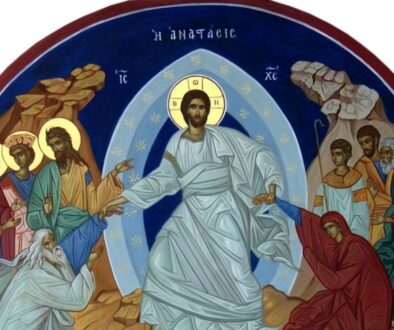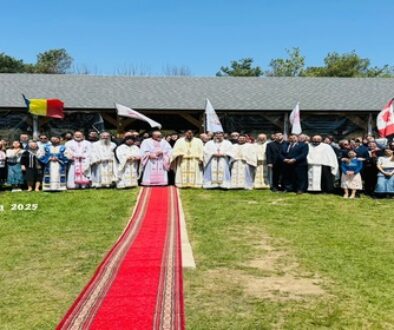+IOAN CASIAN: PASTORAL LETTER AT THE FEAST OF THE LORD’S NATIVITY, 2021
holycrossorthodoxmonastery Uncategorized
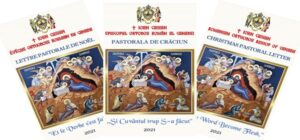
PASTORAL LETTER
AT THE FEAST OF THE LORD’S NATIVITY, 2021
† IOAN CASIAN
by the mercies of God,
Bishop of the Romanian Orthodox Diocese of Canada
To our beloved clergy and Orthodox Christians,
peace and joy from Christ the Lord,
and from us, hierarchical Blessings.
“But when the fullness of the time had come, God sent forth His Son,
born of a woman, born under the law, to redeem those who were under the law,
that we might receive the adoption as sons.”
(Galatians 4, 4-5)
Most Reverend Fathers,
Beloved Faithful,
Here we are at the great feast of the Nativity of our Lord Jesus Christ in the manger of Bethlehem, as the prophecy says: “But you, Bethlehem Ephrathah, though you are little among the thousands of Judah, yet out of you shall come forth to Me the One to be Ruler in Israel, whose goings forth are from of old, from everlasting” (Micah 5, 2). The promise of the coming of the Redeemer of humanity, which the chosen people had been waiting for a long time, is fulfilled. The long awaiting expectation in faithfulness comes to fruition. The grace of God’s appearing in the flesh replaces the visions and signs of the Old Testament period.
Why is the Feast of the Nativity of Jesus Christ so important?
The answer is found in the icos of the feast: “Bethlehem has opened Eden, come, let us see; We have found the mysterious delight inside the cave; come, let us behold Paradise. There, the unwatered root appeared, dawning forgiveness; there, the undug well from which David had longed to drink of, has been found; there the Virgin, giving birth to the Child, quickly quenched the thirst of Adam and David. Let us go to Bethlehem, where a young Child was born, God from everlasting.”
The birth of Jesus Christ is the event in which the foundation of our path to heaven, to the kingdom of heaven, is laid. Christ is the new Adam whose restored and transfigured humanity is filled with the divine graces of the Holy Spirit. Christ, as new Adam, restores our human nature in the image and likeness of God. The first Adam and Eve, by disobedience to God’s command, at the suggestion of the devil, fell into sin, turning away from God. Bethlehem is the event in which we receive forgiveness. It is the moment when the disobedience of the old Adam is abolished, and the medicine of our healing is given to us in Christ. The Virgin Mary overcomes the weakness of human nature through perfect obedience and fulfillment of God’s will when she utters the words “Behold the handmaid of the Lord! Be unto me according to your word!” (Luke 1, 38).
The cave of Bethlehem is the fountain of God’s grace and blessing from which springs the living water, which is the divine work of our redemption and restoration. Bethlehem is the time when God enters His creation to unite it with Himself and to re-establish the intimate connection between man’s effort and the power of divine grace for the cleansing of passions and sin. It is the moment when the existential, ontological, unfulfilled thirst for the full communion with God, resulting from man’s falling away from Him through disobedience, is quenched by the union of the Son of God with human nature in the incarnation.
Bethlehem is the moment when we contemplate in our midst the presence of eternity, born in time beyond understanding. In the event of Bethlehem, we glimpse the premises of our salvation. In the Infant Jesus, born in the manger of Bethlehem, we already see, through repentance, the Paradise, and the kingdom of heaven present, according to the words of the Holy Prophet John the Baptist: “Repent, for the kingdom of heaven is at hand!” (Matthew 3, 2).
Why could only the Son of God accomplish this work?
“The reason (of the incarnation – n.t.) – says St. Athanasius the Great – was that it was not possible for anyone else to turn the corruptible into the incorruptible except the Savior, who made all that is in the beginning. Also, it was not possible for anyone else to restore man’s life in the image of God other than the image of the Father (Christ – n.t.). And it was not possible for anyone else to make, by resurrection, the mortal one immortal, but the One who was Life, that is, our Lord Jesus Christ. And it was not possible to teach about the Father and annihilate the superstition of idols if not the Ruler who created everything and is the only Begotten true Son of the Father.”[1]
So, what did St. Athanasius the Great mean by the reversal of this tendency of man from corruption to incorruptibility? First, man needed to be restored in the image and likeness of God as he had been in paradise. The fall of man had affected his nature and spiritual growth so much that he alone could no longer reverse the tendency to corruption and control the passions that had penetrated in him and altered his life. Through disobedience, fear enters man, and he starts hiding from God’s face.[2]Through sin, man drifts away from God and loses the immediate and direct contemplation of God. Through sin, death becomes a daily reality of human life. Death was the end of a hard-working, arduous life.
To be able to heal and restore all this, it was necessary someone who, not having in himself all these weaknesses and consequences of sin, to appropriate, heal and transfigure them, bringing man back to his initial natural state designed by God from eternity. This work could only be accomplished by God Himself through His Son. If God created the world and man through His Son, it was natural that their restoration should be done in the same way through the Son because He is the Architect of creation and the One who know it best. The Son of God knew the Father best and could restore man’s knowledge to its authenticity: “All things have been delivered to Me by My Father, and no one knows the Son except the Father. Nor does anyone know the Father except the Son, and the one to whom the Son wills to reveal Him” (Matthew 11, 27). He could restore man’s life because He was the Life itself: “I am the Way, the Truth, and the Life” (John 14, 6). Who could speak better of the Father than the Son who is united with Him? “I and My Father are one” (John 10, 30). Jesus is the image of the Father after which we humans were created. He taught us the divine things He who dwelt among us but never left the heavens and the communion of the Holy Trinity. Truly we can say that God, descending among us and in us united heaven with earth. The spiritual distance between man, the world, and God is suppressed in the Person of the Savior Christ by incarnation at the Creator’s initiative.
Through the Incarnation, the Son of God takes human nature from the Virgin Mary and makes it His own, thus restoring man according to God’s plan. To live the moment of Bethlehem as a spiritual event means to be lifted again to the height of face-to-face contemplation of God and union with Him in the image of Edenic life. The Magi who found Him in the manger of Bethlehem met in the Infant Jesus the Son of God Himself.
The life of the believer is a journey from the Incarnation to the Resurrection. It is a path from the incarnation in the personal life of the divine virtues to the spiritual resurrection in the earthly life that will be completed in the final resurrection of all. Then, the Incarnation will also see its fulfillment accomplished, that is, the nature of man united and working mysteriously in a synergic way with the grace of the Holy Spirit. Man begins this journey in the Church through Baptism and through the other Holy Sacraments and through faith he appropriates in his personal life the new life in Christ. The gift of our redemption, restoration, and salvation in Christ is a sign of God’s generosity and love for us.
Beloved faithful,
For more than a year and a half, we’ve been through a difficult period of pandemic which has affected and still affects us both personally and as a community. To the fears of a medical nature were added the consequences of restrictions on the possibility to gather under God’s protection in churches to pray and strengthen ourselves. Loneliness, the fear of the other as a potential vector of contamination with possible severe effects especially for the fragile, has become a recurring theme in public discourse and in our encounters. “Let us be attentive!” are the words of the Divine Liturgy. Let us pay the necessary attention, let us, let us proceed with discernment, wisdom, and prudence, but also with boldness, hope, and steadfast faith, “for God is with us” (Great Compline).
We owe a debt of love and faith to God because through them we remain in fellowship with Him and receive the gift of redemption and salvation fulfilled in Christ. We must also be careful with our own lives, our physical health, and the health of others. They are also God’s gifts entrusted to us, so we are responsible for them and for seeking guidance and counsel in this regard.
First, we need to rebuild our brotherhood and friendship. Christ became one of us. He became our brother according to the human nature and called the apostles His friends: “You are My friends if you do whatever I command you” (John 15, 14). By fulfilling the commandments of love for God and neighbor, we rebuild our social and human fabric in God’s spirit. Our words, gestures, our life in general, will increasingly reflect the spiritual stature to which man is called by God, that is, to be the image and likeness of God.
The season of Lord’s Nativity or Christmas is a time of generosity and gratitude. “So let’s try to be like magi! – says St. John Chrysostom. Let us free ourselves from the pagan customs, let us move far away from them, to see Christ; that even the magi would not have seen Him if they had not departed from their land.”[3] Let us detach ourselves from our troubling and confusing past and follow like the Magi the light that comes from the manger of Bethlehem of our churches. They receive the Infant Jesus. “Let’s run to the Infant’s house! – St. John Chrysostom urges us further. May our longing not be quenched even if kings, peoples and tyrants cut us off. That way, we can get all the obstacles out of our way.”[4] Let us seek the Church because there we will find Christ the Lord, born in a poor manger.
Beloved Christians,
The year 2021 as a Homage year for the pastoral care of Romanians abroad and a Commemorative year for those fallen asleep in the Lord; the liturgical and cultural value of cemeteries was a time of meditation on the past, of understanding and action in the present but also a time of thinking about the future. We have tried to be generous in our diocesan and parish initiatives. We have tried to understand and be inspired by the generosity of those who preceded us and who founded many of our churches. All were done through the spirit of sacrifice and diligence, hard work and patience, boldness, hope, faith, humility, and perseverance.
Let us be generous with our time as God has been generous with us! Let us offer it to those in need. Let us be generous in dedicating ourselves to the knowledge of God and to the practice of almsgiving! Giving good advice, listening to someone who is sad, suffering, or in trouble changes the quality of our personal time in the spirit of love and generosity. Let us dedicate our time to our children! Let us teach them the basics of the first steps toward God! Let us devote our time to the family as a source of life, human wealth, and hope! Let us devote it to the Church through common prayer, almsgiving, and assistance during our fraternal agape that strengthens communion, taking responsibility for Sunday schools that instruct our children in the faith! Let us dedicate our time to the missionary work and preaching the Gospel that can change the world and bring us salvation! Let us devote our time to the fight against hatred, envy, ignorance, and isolation so that the image and likeness of God may shine brighter in each of us!
In this special year, dedicated to all Romanians from everywhere, I want to thank the clergy, those in charge at the diocesan and parish level, the Ladies’ Auxiliary organisation (AROLA), youth organisation (ROYA), to the coordinators at the Education department and Sunday schools as well as to all the faithful for their effort, dynamism and creativity, for their perseverance, dedication and sense of responsibility!
On the feasts of the Lord’s Nativity, New Year, and the Epiphany, I wish that “the grace of our Lord Jesus Christ be with your spirit. Amen” (Philemon 1, 25).
Merry Christmas! A Blessed New Year!
Your servant, brother and friend,
fervently praying for you and wishing you all good things,
† IOAN CASIAN
Saint-Hubert/Montreal 2021
_________
[1] St. Athanasius the Great. Treatise on the Incarnation of the Word. (translation, introductory study and notes by Prof. Dr. Dumitru Stăniloae). EIBMO Publishing House: Bucharest 2010, pp. 169-170
[2] Genesis 3; 8, 10
[3] St. John Chrysostom. Homilies to Matthew (PSB 23). EIBMBOR Publishing House: Bucharest, 1994, p. 96
[4] Ibidem
